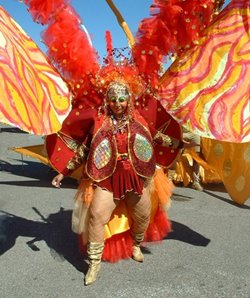Caribbean Carnival
A Festival of Freedom and Creativity
by Michelle Parson - Office Manager
 Michelle at the 2005 Caribbean Carnival in a costume designed by Roz Roach, titled Metamorphosis
Michelle at the 2005 Caribbean Carnival in a costume designed by Roz Roach, titled Metamorphosis
This year, 2021, for the second time in its fifty-four year history, there will be no in-person parade for the Toronto Caribbean Carnival. Celebrated on the first weekend of August, the city becomes abuzz with carnivalesque activity - inundated with diasporic Caribbean and African peoples from every corner of the world who arrive to be a part of this enormous festival of colour, music, art, creativity and vibrancy. They bring with them a huge stimulus of economic activities benefiting various sectors of the city’s hospitality industry. A 2010 Ipsos-Reid report revealed that the festival provided an economic input of $438 million to the Province of Ontario,
as reported by Toronto Star.
While there are Caribbean style festivals in different parts of the world - Miami, New York, Brixton, literally anywhere Caribbean people settle, the Carnival event in Toronto is considered the largest Caribbean style Carnival Festival in the world outside of Trinidad and Tobago. This year the carnival would have been even more special. This August 1st will be the first time that Emancipation Day is a federally recognized holiday in this country, marking the anniversary of the Slavery Abolition Act of 1834, liberating every enslaved African in Canada.
The origin of the Caribbean Carnival dates back to the end of slavery in Trinidad and Tobago. Newly liberated African-descended plantation workers in Trinidad left their plantations and flooded the streets in joyful abandon, snatching up the discarded garments of their former slave owners, to be used as costumes and disguises, mimicking and satirizing the dress and behaviours they had observed in the pre-Lenten masquerade balls and parties thrown by their former masters. They grabbed up metal cans and boxes, pieces of wood and bamboo, and beat on them to create percussive rhythms for dancing (African drums had long been banned for fear of coded messages being sent across the miles to induce slave uprisings) and chantouelles - the “journalists'' and “reporters'' of the time, sang satirical renditions about the living conditions of their existence as well as songs of rebellion. This was the first Freedom Fête that became an annual tradition, the harbinger of Toronto’s August long weekend Caribbean festival.
Those discarded garments have over many years paved the way for inventive, innovative and artistic costume creations, designed by talented artists who receive little recognition; built and executed by hundreds of volunteers who work long hours simply for the love of the artform, and performers that bring them to life on the stage and streets. The metal containers, wood and bamboo percussive (tamboo-bamboo) instruments are the forerunners of Trinidad and Tobago’s steel drum or steelpan. Invented in the late 1930s from a discarded 55 gallon oil drum, steelpan symphonies have been heard in the most prestigious music halls across the world, and are now giving way to the digitally driven E-pan, invented in Toronto, and its Trinidad counterpart the Percussive Harmonic Instrument (PHI), also digitally driven. And those chantouelles, now known as calypsonians, continue to regale audiences with their takes on current events, history, and any and every possible topic. The evolution of kaiso (calypso) to soca and its many sub-genres, creates the rhythm and pace of movement for spectacular costumed individuals and parade participants to bring intense colour to every city that enjoys a Caribbean Carnival festival.
A Caribbean Carnival is a true festival of freedom, liberation, rebellion and inventiveness. As a mixed-race Caribbean immigrant, artist and arts lover, the enormity of this realization affords the festival all of my respect, wishing that others would see it as such and #respectdemas.
This might be the second year in a row that an in-person carnival is not taking place but there is still a lot to experience, learn, and enjoy. Click here to learn more about the history of the carnival in Toronto.
Follow Toronto Carnival’s Instagram here.
Michelle Parson is the Office Manager at Toronto Arts Council and Toronto Arts Foundation. When not at her desk she is an active performing artist.